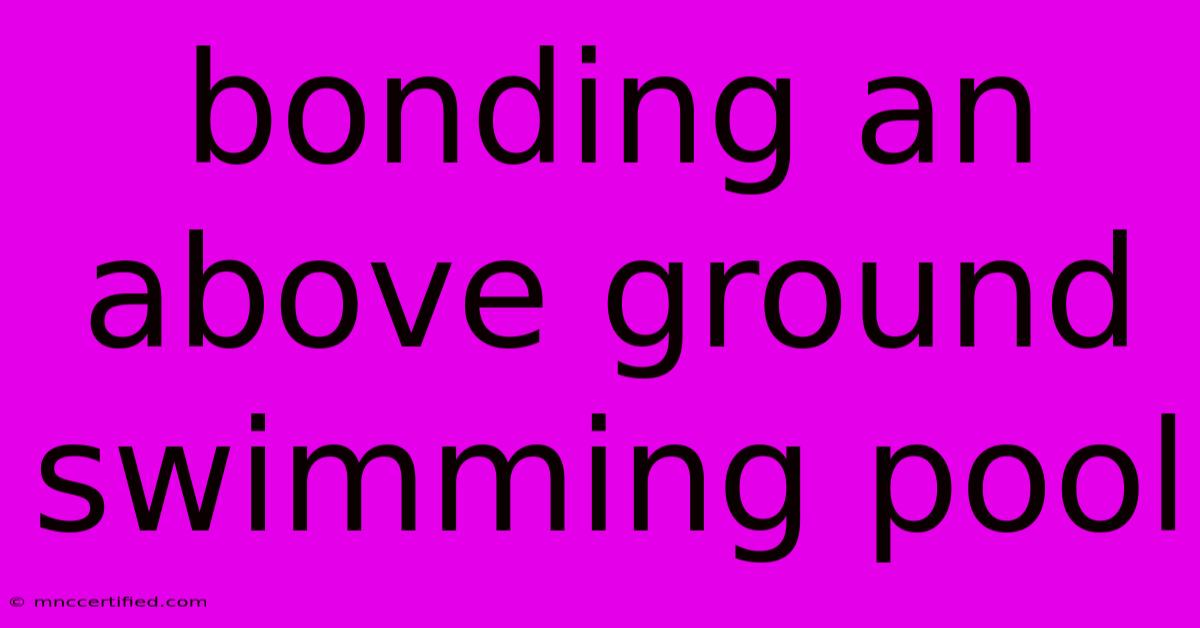Bonding An Above Ground Swimming Pool

Table of Contents
Bonding Your Above Ground Pool: A Comprehensive Guide to Safety and Longevity
Owning an above ground pool is a fantastic way to enjoy the summer months, but ensuring its safety and longevity is paramount. One crucial aspect of pool maintenance is bonding. This process connects all metal components in your pool to a grounding rod, preventing electrical shock hazards and protecting your investment.
Why Bonding Matters
- Electrical Safety: Above ground pools often have metal components like ladders, handrails, and skimmer boxes. If these components come into contact with a stray electrical current, they can become energized. Bonding creates a path for the current to flow to the ground, minimizing the risk of electrocution.
- Preventing Corrosion: Bonding helps prevent corrosion by equalizing the electrical potential between metal parts. This means that any stray currents are redirected to the ground, rather than flowing between different metal surfaces in your pool, reducing the risk of rust and damage.
- Compliance with Codes: Most local building codes require above ground pools to be properly bonded for safety reasons.
The Bonding Process Explained
- Identifying Conductive Parts: You need to connect all metallic parts of your pool to the grounding rod. This includes:
- Handrails
- Ladders
- Light fixtures
- Skimmer boxes
- Pool equipment (pump, filter, heater)
- Metal fencing
- Grounding Rod: A grounding rod, typically made of copper, is driven deep into the ground near the pool. This rod provides a direct path for electrical currents to flow into the earth.
- Bonding Wire: A heavy-gauge copper wire, usually #6 or #8 AWG, is used to connect all the metal parts together and to the grounding rod.
- Clamps: Clamps or connectors are used to secure the bonding wire to the metal components and the grounding rod.
- Inspection and Testing: After the bonding system is installed, it should be inspected and tested by a qualified electrician to ensure proper function and safety.
DIY Bonding or Professional Installation?
While bonding your pool yourself is possible, it is often recommended to hire a qualified electrician. Electrical work can be dangerous, and a licensed professional will ensure that the system is installed correctly and meets all safety codes.
Essential Tips for Bonding an Above Ground Pool
- Choose the Right Materials: Use high-quality copper bonding wire and clamps designed for outdoor use.
- Proper Grounding Rod Installation: Ensure the grounding rod is installed deep enough and according to local codes.
- Consistent Connection: Ensure all metal parts are connected to the bonding wire without gaps or breaks.
- Regular Inspection: Periodically inspect the bonding system for damage, corrosion, or loose connections.
The Importance of Maintaining Your Bonding System
Once the system is installed, it's crucial to maintain it for continued safety and effectiveness. Here's what to do:
- Inspect Regularly: Look for signs of corrosion, damage, or loose connections.
- Clean Connections: Remove any dirt or debris that might interfere with the system's effectiveness.
- Test Annually: Have a qualified electrician test the bonding system annually to ensure it's functioning correctly.
Conclusion
Bonding your above ground pool is a critical investment in safety and longevity. By creating a safe and reliable electrical path, you can minimize shock hazards and protect your pool from corrosion. Remember, safety should always come first, so consider consulting a professional electrician for installation and annual testing. With proper bonding and maintenance, you can enjoy your pool for years to come with peace of mind.

Thank you for visiting our website wich cover about Bonding An Above Ground Swimming Pool. We hope the information provided has been useful to you. Feel free to contact us if you have any questions or need further assistance. See you next time and dont miss to bookmark.
Featured Posts
-
Fur Trading And Catholic Mission Work
Nov 10, 2024
-
Premier League Brighton Vs Man City Live Stream
Nov 10, 2024
-
Arcane Season 2 Returns With More Action
Nov 10, 2024
-
Hoggs Wife Speaks Out On Abuse Case
Nov 10, 2024
-
Rock Ridge Insurance Why So Expensive
Nov 10, 2024